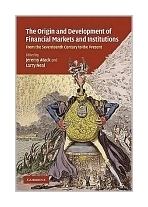|
||
• wydawnictwa polskie
• Zamów informacje o nowościach z wybranego tematu • kontakt
• Cookies na stronie |
THE ORIGIN AND DEVELOPMENT OF FINANCIAL MARKETS AND INSTITUTIONSATACK J. NEAL L. EDITOR /FROM THE SEVENTEENTH CENTURY TO THE PRESENTwydawnictwo: CAMBRIDGE UP , rok wydania 2009, wydanie Icena netto: Collectively, mankind has never had it so good despite periodic economic crises of which the current sub-prime crisis is merely the latest example. Much of this success is attributable to the increasing efficiency of the world's financial institutions as finance has proved to be one of the most important causal factors in economic performance. In a series of original essays, leading financial and economic historians examine how financial innovations from the seventeenth century to the present have continually challenged established institutional arrangements, forcing change and adaptation by governments, financial intermediaries, and financial markets. Where these have been successful, wealth creation and growth have followed. When they failed, growth slowed and sometimes economic decline has followed. These essays illustrate the difficulties of coordinating financial innovations in order to sustain their benefits for the wider economy, a theme that will be of interest to policy makers as well as economic historians. Table of Contents
List of figures List of tables 1 Financial innovations and crises: The view backwards from Northern Rock Jeremy Atack Atack, Jeremy 1 2 An economic explanation of the early Bank of Amsterdam, debasement, bills of exchange and the emergence of the first central bank Stephen Quinn Quinn, Stephen William Roberds Roberds, William 32 3 With a view to hold: The emergence of institutional investors on the Amsterdam securities market during the seventeenth and eighteenth centuries Oscar Gelderblom Gelderblom, Oscar Joost Jonker Jonker, Joost 71 4 Was John Law's System a bubble? The Mississippi Bubble revisited Francois R. Velde Velde, Francois R. 99 5 Sir George Caswall vs. the Duke of Portland: Financial contracts and litigation in the wake of the South Sea Bubble Gary S. Shea Shea, Gary S. 121 6 The bell jar: Commercial interest rates between two revolutions, 1688-1789 Marc Flandreau Flandreau, Marc Christophe Galimard Galimard, Christophe Clemens Jobst Jobst, Clemens Pilar Nogues-Marco Nogues-Marco, Pilar 161 7 Comparing the UK and US financial systems, 1790-1830 Richard Sylla Sylla, Richard 209 8 Natural experiments in financial reform in the nineteenth century: The Davis and Gallman analysis Larry Neal Neal, Larry 241 9 Regulatory changes and the development of the US banking market, 1870 1914: A study of profit rates and risk in national banks Richard J. Sullivan Sullivan, Richard J. 262 10 Anticipating the stock market crash of 1929: The view from the floor of the stock exchange Eugene N. White White, Eugene N. 294 11 The development of "non-traditional" open market operations: Lessons from FDR's silver purchase programRichard C. K. Burdekin Burdekin, Richard C. K. Marc D. Weidenmier Weidenmier, Marc D. 319 12 The interwar shocks to US-Cuban trade relations: A view through sugar company stock price data Alan Dye Dye, Alan Richard Sicotte Sicotte, Richard 345 13 Central bank reaction functions during the inter-war gold standard: A view from the periphery Kirsten Wandschneider Wandschneider, Kirsten 388 14 When do stock market booms occur? The macroeconomic and policy environments of twentieth century booms Michael D. Bordo Bordo, Michael D. David C. Wheelock Wheelock, David C. 416 15 Lessons from history for the twenty-first century Larry Neal Neal, Larry 450 Index 465 494 pages,Hardcover Księgarnia nie działa. Nie odpowiadamy na pytania i nie realizujemy zamówien. Do odwolania !. |


